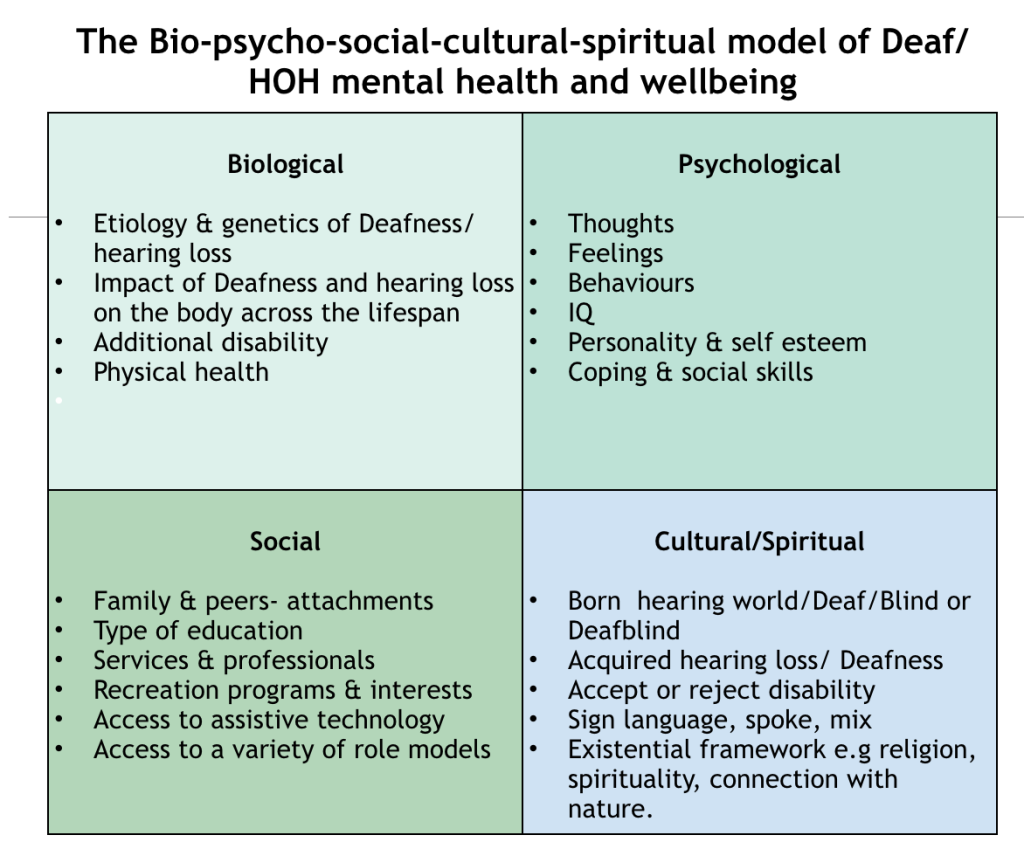People living with Deafness can be particularly susceptible to a variety of mental health challenges. In fact, Deaf people can be twice as likely to experience mental health issues such as anxiety and depression compared to hearing people. Additionally, the communication barrier between Deaf people and those who could help and treat them- such as doctors and mental health professionals- can make the symptoms worse.
For my full presentation on this topic, please visit this link. Password is CHQCYMHS. Video has live captioning and interpreter.
It’s important to remember that language deprivation does not equal psychopathology. Symptoms must be considered within the context of expressive and receptive communication challenges. When making a diagnosis, multiple forms of assessment are needed, such as self-reporting, clinical tests, observation, and consultation with Deaf or Hard of Hearing (HOH) specialists.
Incidental Learning
For most hearing people, academic, social and emotional wellbeing is learned indirectly, through all the senses but particularly hearing. Deaf or Hard of Hearing people do not have this advantage. They may struggle to develop emotional literacy and may be too embarrassed to ask questions regarding topics such as sex education, puberty, drug use, etc. Public Health messages, such as television or radio-based public health campaigns, may also require additional explanation. Deaf and Hard of Hearing people need to be engaged communicators and have people around them, such as friends and family, who are also engaging in communication with them. It’s important to explain information clearly when communicating with a Deaf/HOH person, and check their understanding- do not assume they have understood.
Common Mental Health Issues amongst Deaf Children and Youth
- Anxiety /phobias e.g. separation
- Depression
- Abuse/trauma
- Self-harm and suicidal ideation
- Behavioural issues e.g. running away, anger, meltdowns
- hurting other children
- Social skills and friendship issues
- Difficulties following routines (e.g new class, teacher & room).
- Anger at the world/hearing people
- Lack of ability to self-advocate
- Low self-esteem/ low expectations of self
The Bio-Psycho-Social-Cultural-Spiritual model
The bio-psycho-social-cultural-spiritual model is designed to help parents, teachers, mental health professionals, academics and clients

Case Study
A 6-year-old Deaf girl (native Auslan) was referred for counselling due to behavioural issues at home (e.g. refusing to follow instructions and routines) and difficulties using the toilet at school and in public places. The child presented as anxious and angry. Parents were both culturally Deaf.
- How to utilize bio-psycho-social-cultural and –spiritual model?
- BIO: medical assessment re toileting issues, psyched re diet, sleep & links with memory, focus at school and emotions/behaviours
- PSYCHO: IQ assessment & functional assessment, positive behaviour support plan, visual boards for the morning, night & school routines
- SOCIAL: increase interaction with non-signing children (mix), encourage supported communication e.g. ordering and paying for own food.
- CULTURAL/SPIRITUAL: Celebrate Deaf identity and promote interacting with the hearing and Deaf world e.g. multiple role models.
